Related Research Articles

General Sir Michael David Jackson, was a British Army officer and one of its most high-profile generals since the Second World War. Originally commissioned into the Intelligence Corps in 1963, he transferred to the Parachute Regiment in 1970, with which he served two of his three tours of duty in Northern Ireland. On his first, he was present as an adjutant at the events of the Ballymurphy massacre (1971), where eleven unarmed civilians were shot dead by British troops, and then at Bloody Sunday in 1972, when British soldiers opened fire on unarmed protesters, killing fourteen. On his second, he was a company commander in the aftermath of the Warrenpoint ambush (1979), when the IRA killed 18 soldiers with two roadside bombs, the British Army's heaviest single loss of life during the Troubles. He was assigned to a staff post at the Ministry of Defence (MoD) in 1982 before assuming command of the 1st Battalion, Parachute Regiment, in 1984. Jackson was posted to Northern Ireland for the third time, as a brigade commander, in the early 1990s.
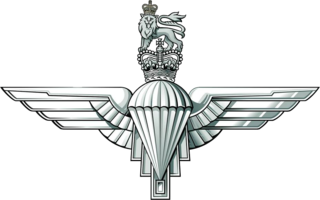
The Parachute Regiment, colloquially known as the Paras, is the airborne and elite infantry regiment of the British Army. The first battalion is part of the Special Forces Support Group under the operational command of the Director Special Forces. The other battalions are the parachute infantry component of the British Army's rapid response formation, 16 Air Assault Brigade. Alongside the five regiments of Foot Guards, the Parachute Regiment is the only infantry regiment of the British Army that has not been amalgamated with another unit since the end of the Second World War.
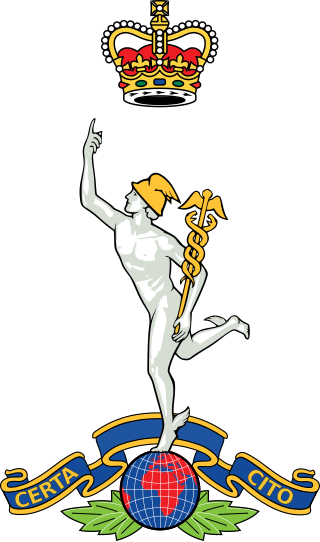
The Royal Corps of Signals is one of the combat support arms of the British Army. Signals units are among the first into action, providing the battlefield communications and information systems essential to all operations. Royal Signals units provide the full telecommunications infrastructure for the Army wherever they operate in the world. The Corps has its own engineers, logistics experts and systems operators to run radio and area networks in the field. It is responsible for installing, maintaining and operating all types of telecommunications equipment and information systems, providing command support to commanders and their headquarters, and conducting electronic warfare against enemy communications.
The Battle of Two Sisters was an engagement of the Falklands War during the British advance towards the capital, Port Stanley. It took place from 11 to 12 June 1982 and was one of three battles in a Brigade-size operation all on the same night, the other two being the Battle of Mount Longdon and the Battle of Mount Harriet. It was fought mainly between an assaulting British force consisting of Royal Marines of 45 Commando and an Argentine Company drawn from 4th Infantry Regiment.

The Battle of Mount Longdon was fought between the British 3rd Battalion, Parachute Regiment and elements of the Argentine 7th Infantry Regiment on 11–12 June 1982, towards the end of the Falklands War. It was one of three engagements in a Brigade-size operation that night, along with the Battle of Mount Harriet and the Battle of Two Sisters. A mixture of hand-to-hand fighting and ranged combat resulted in the British occupying this key position around the Argentine garrison at Port Stanley. The battle ended in a British victory.
This is a list of British ground forces in the Falklands War. For a list of ground forces from Argentina, see Argentine ground forces in the Falklands War
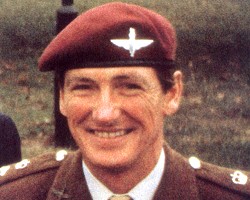
Lieutenant Colonel Herbert Jones,, known as H. Jones, was a British Army officer and posthumous recipient of the Victoria Cross (VC). He was awarded the VC after being killed in action during the Battle of Goose Green for his actions as commanding officer of the 2nd Battalion, Parachute Regiment, during the Falklands War.

The 6th South African Armoured Division was the second armoured division of the South African Army and was formed during World War II. Established in early 1943, it was based on a nucleus of men from the former 1st South African Infantry Division who had returned to South Africa after the Second Battle of El Alamein in late 1942. The division was initially transferred to Egypt for training, after which it served in the Allied campaign in Italy during 1944 and 1945. In Italy, the division was initially deployed as part of the British Eighth Army, under command of Lieutenant-General Oliver Leese, and was then transferred to the U.S. Fifth Army, under Lieutenant General Mark W. Clark, for the remainder of the Italian Campaign. The division operated as a strongly reinforced division and was frequently used to spearhead the advance of the Corps and Army to which it was attached. They returned home after the end of the war in Italy and were disbanded in 1946. The division was also briefly active after the war from 1 July 1948 to 1 November 1949.

Mount Longdon is a hill located in the east of East Falkland island forming part of the Falkland Islands Archipelago. It has an elevation of 186 metres above sea level. It is the highest land in any direction for 2 kilometres. Mount Longdon is named after Lt Col Richard Longdon, who was the commanding officer of the 2nd Battalion, Parachute Regiment of the British Army during the Falklands War. It is best known as the site of the Battle of Mount Longdon, and overlooks Stanley, the capital of the Falkland Islands.

16 Air Assault Brigade Combat Team, known simply as 16 Air Assault Brigade from 1999 – 2021, is a formation of the British Army predominantly based in Colchester, Essex. It makes up the Air Assault Task Force, a battlegroup held at high readiness, and is the only brigade in the British Army focused on operating via parachute, helicopter and air-landing.

The 5th Infantry Brigade was a regular infantry brigade of the British Army that was in existence since before the First World War, except for a short break in the late 1970s. It was an Airborne Brigade from the early 1980s until amalgamating with 24th Airmobile Brigade, in 1999, to form 16 Air Assault Brigade.
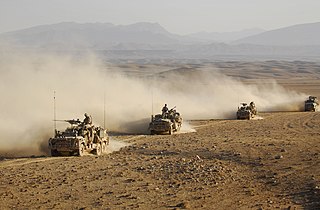
The special forces of the Australian Defence Force are units of Special Operations Command and associated units of the Royal Australian Navy and the Royal Australian Air Force that conduct and or support special operations to advance and protect the national security of the Commonwealth of Australia. The special forces of Australia have a lineage to a variety of units raised in the Second World War such as the Independent and Commando Companies, Z Special Unit, Navy Beach Commandos, and the Coastwatchers. Australian special forces have most recently been deployed to Iraq in Operation Okra as the Special Operations Task Group, as the Special Operations Task Group in Afghanistan, in Afghanistan in support of the Australian Secret Intelligence Service and regularly for counter-terrorism pre-deploy to locations of major domestic events throughout Australia in readiness to support law enforcement such as the 2014 G20 Brisbane summit.
Major General Charles Dair Farrar-Hockley, MC is a retired British Army officer, and a former Director General of the Chartered Institute of Arbitrators. He is the son of General Sir Anthony Farrar-Hockley.
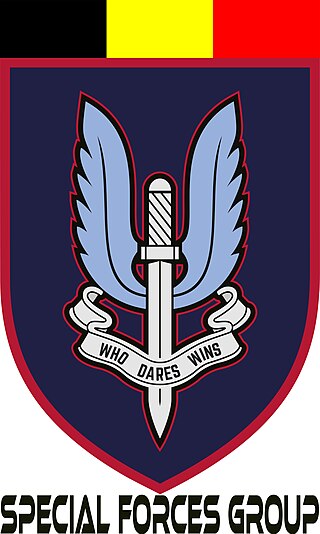
The Special Forces Group is the special forces unit in the Land Component of the Belgian Armed Forces.
Terence John Peck was a member of the Falkland Islands Defence Force who during the 1982 Falklands War became a war hero by spying on the Argentine invaders, subsequently escaping to British lines, acting as a scout for 3rd Battalion, Parachute Regiment, and taking part in the fighting for Mount Longdon. A fiercely patriotic Islander, he vehemently opposed Argentina's claim to the Islands. He later met and befriended an Argentine conscript who served during the war.

The Second Battalion, Parachute Regiment, is a formation of the Parachute Regiment, part of the British Army, and subordinate unit within 16th Air Assault Brigade.

The Norfolk Police and Crime Commissioner is the police and crime commissioner, an elected official tasked with setting out the way crime is tackled by Norfolk Police in the English County of Norfolk. The post was created in November 2012, following an election held on 15 November 2012, and replaced the Norfolk Police Authority. The current incumbent is Sarah Taylor, who represents the Labour and Co-operative Party.

Brian Faulkner DCM is a former soldier of the Parachute Regiment in the British Army and a veteran of the Falklands War during which he was awarded the Distinguished Conduct Medal (DCM) for bravery. This was a field award for other ranks of the British Army and was the oldest British award for gallantry, at that time ranking second only to the Victoria Cross. His DCM was one of only eight awarded during the conflict, five of which were awarded to the Parachute Regiment. Faulkner is a member of The Gallantry Medallists' League of the United Kingdom. He received his medal from Queen Elizabeth II during an investiture ceremony at Buckingham Palace in 1982.
Sarah Taylor was elected the Norfolk Police and Crime Commissioner in the 2024 England and Wales police and crime commissioner elections representing the Labour Party. She defeated Giles Orpen-Smellie of the Conservative Party, the incumbent since 2021.
References
- 1 2 "Giles Orpen-Smellie". Embrace. Retrieved 3 May 2024.
- 1 2 "Tactical Intelligence in the Falklands War". National Army Museum. Retrieved 3 May 2024.